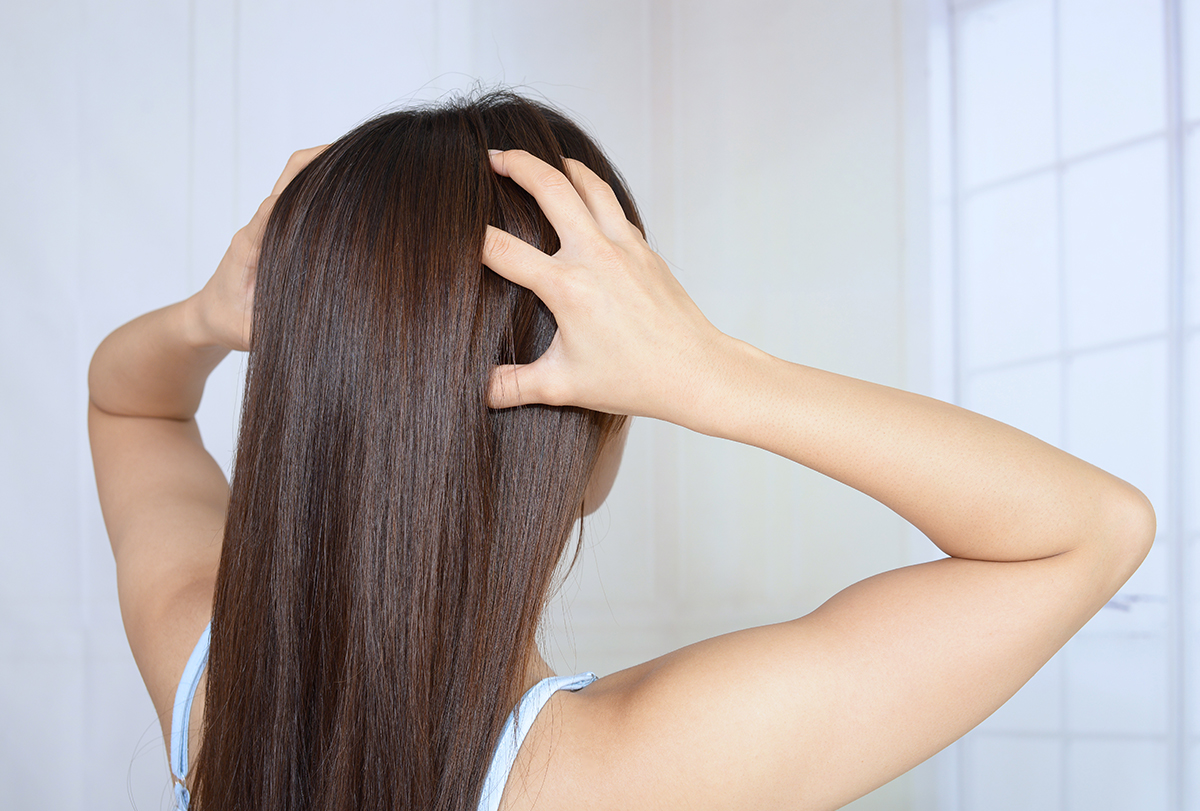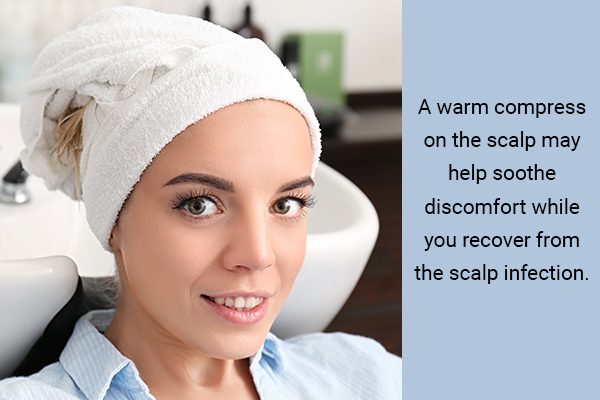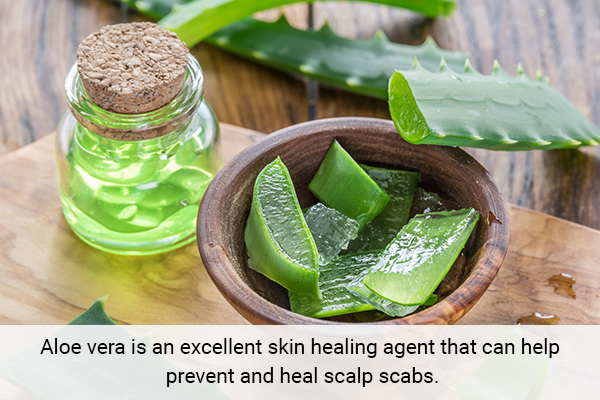In this article:
Scalp scabs are raised crusty bumps on the scalp that tend to be quite itchy and prickly. Scab formation is part of the natural skin healing process.

When your skin is ruptured, it forms hard thick tissue over the wound to shield it from external irritants and further damage as it heals.
As the body produces new skin cells to repair the wound, the overlying scab tissue becomes drier and gradually loosens to fall off the skin. The removal of the scab will reveal new healed skin underneath.
But there is one issue that gets in the way of this process. As the scabs dry out, they become extremely itchy and discomforting. This triggers the urge to scratch or pick at them, which only damages the new skin formed underneath and delays the healing process.
Home Remedies to Treat Scalp Scabs
Here are a few home remedies that can help alleviate the itchiness associated with scalp scabs to keep you from scratching them. However, if the condition is severe, please consult a doctor.
1. Apply a cold compress
The application of cold temperature on the scalp will numb the underlying nerve endings to alleviate the itch and limit blood flow in the area to curb inflammation.
This is an easy way to control your urge to scratch the scab, although the effects only last for a short period. But you can use this remedy multiple times a day for maximum itch relief. (1)
How to use:
- Soak a clean soft towel or cloth in cold water.
- Wring out the excess liquid.
- Cover your scalp with this damp cloth for 10–15 minutes.
- Do this several times a day.
2. Apply a warm water compress

Scalp infections cause inflammation of the hair follicles, which leads to itching, irritation, and the development of open sores that scab over as they heal. But scab formation further enhances the itchiness in the scalp, urging you to scratch, which often leads to delayed healing and secondary infections.
Applying a warm compress to the scalp may help soothe the discomfort while you recover from the scalp infection. (2)
The gentle heat stimulates blood circulation under the scalp to relieve inflammation and thereby reduce itching, redness, and swelling. Plus, it gradually softens the scab so that it sheds easily without damaging the newly formed healthy tissue underneath.
How to use:
- Take some warm water in a bowl or bucket and dip a clean towel in it.
- Wring out the excess liquid.
- Wrap your head with a warm damp towel for 10–15 minutes to soften the scab.
- Gently run a comb over your scalp to get rid of any loose scabs.
- Do this at least once daily or 3–4 times if you feel comfortable. (3)
3. Use essential oils
Essential oils are derived from medicinal plants and therefore exhibit a wide variety of healing effects.
They are replete with terpenes and phenolic components that give them antimicrobial properties, which can help clear scalp infections faster. They also help curb scalp inflammation and promote skin repair due to their high antioxidant content. (4)(5)
There is substantial evidence that these potent liquids can be quite effective in controlling seborrheic dermatitis or dandruff. (5)
Some of the best essential oils for soothing and healing scalp scabs are tea tree oil, jojoba oil, neem oil, peppermint oil, lemon oil, and rosemary oil.
Note: Essential oils are quite potent at their original concentration and need to be diluted with a carrier oil before topical use to avoid skin irritation and damage.
How to use:
- Mix 10 drops of your preferred essential oil in ¼ cup of almond oil.
- Gently massage this oil mix into your scalp.
- Let it sit for about 5 minutes before rinsing it off with a mild shampoo and water.
- Use this remedy 2–3 times a week.
4. Aloe vera gel can help

Aloe vera is an excellent skin-healing agent that can help prevent and heal scalp scabs. It is credited with antimicrobial properties that help control scalp infections and the resultant itching.
Aloe vera is full of antioxidants that help alleviate scalp inflammation to reduce itching while also speeding up the wound healing process. Moreover, it is deeply hydrating, which helps soothe dry, itchy, and flaky scalp. (6)(7)(8)
How to use:
- Scoop out the gel from an aloe vera leaf into a bowl.
- Mix the oil from a vitamin E capsule into the gel.
- Apply this mixture to the scalp scabs with a clean finger.
- Leave it on for an hour before rinsing it off with a mild shampoo and water.
- Use this remedy 2–3 times a week.
5. Perform a warm oil massage
Gently massaging your scalp with warm olive or coconut oil can stimulate blood circulation in the area to relieve inflammation and itching. Plus, both these oils possess multiple healing properties.
Olive oil is replete with fatty acids and triglycerides that lubricate the scalp as well as the crusty scabs. This moisture loosens the dry scab tissue so that it sheds faster. (9) Olive oil is also loaded with antioxidants including polyphenols that exhibit strong anti-inflammatory and wound-healing properties. (10)
Similarly, coconut oil provides intensive moisture and reduces that scalp dryness that leads to itching and thereby scab formation. It also works as a potent anti-inflammatory and antimicrobial agent that protects the scalp from irritation, itching, and infection. (11)
How to use:
- Warm ¼ cup of extra-virgin olive or coconut oil.
- Use your fingers to gently massage the oil over your scalp for 5–10 minutes. You can use a comb to spread the oil on your hair.
- Wear a shower cap to avoid dripping and product transfer.
- Leave the oil overnight before rinsing it off the next morning with a mild shampoo and water.
Preventive Tips for Scalp Scabs
Here are some tips to reduce scalp itching and irritation:

- Avoid hair products that contain harsh chemicals such as sulfates and parabens, especially dyes and bleach. Instead, use mild shampoos and conditioners that come without artificial fragrances or preservatives. (1)
- Keep stress under control through yoga, deep breathing, relaxation therapies, regular exercise, and other pleasurable activities that calm your mind.
- Do not scratch your scalp as it will only make the itching worse and lead to more scratching.
- Don’t wash your hair excessively.
Final Word
Even though scalp scabs are completely harmless and self-resolving, you must resist the urge to scratch or pick at them to ensure proper healing.
The home remedies shared in this article can help reduce the dryness, inflammation, and itchiness associated with scalp scabs. Plus, they help accelerate skin repair to get rid of the scabs quickly.
You can also use these remedies to relieve inflammatory scalp conditions such as dandruff, psoriasis, and dermatitis, which make your scalp itchy and lead to scab formation.

- Was this article helpful?
- YES, THANKS!NOT REALLY


